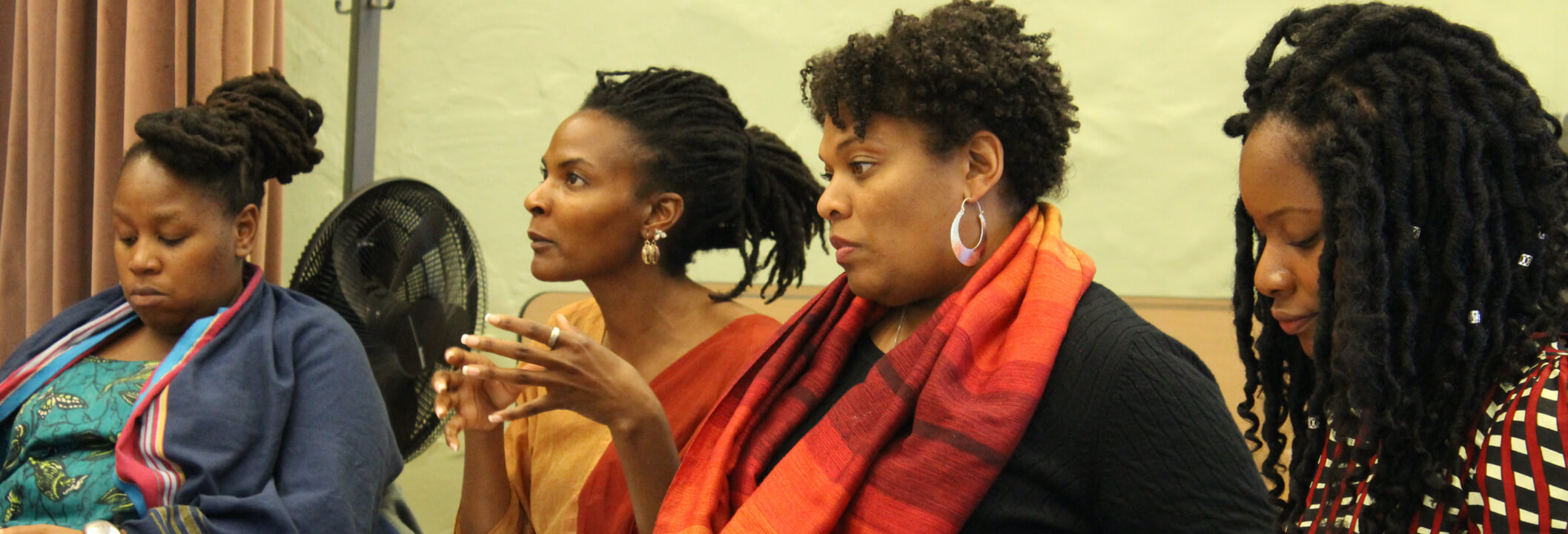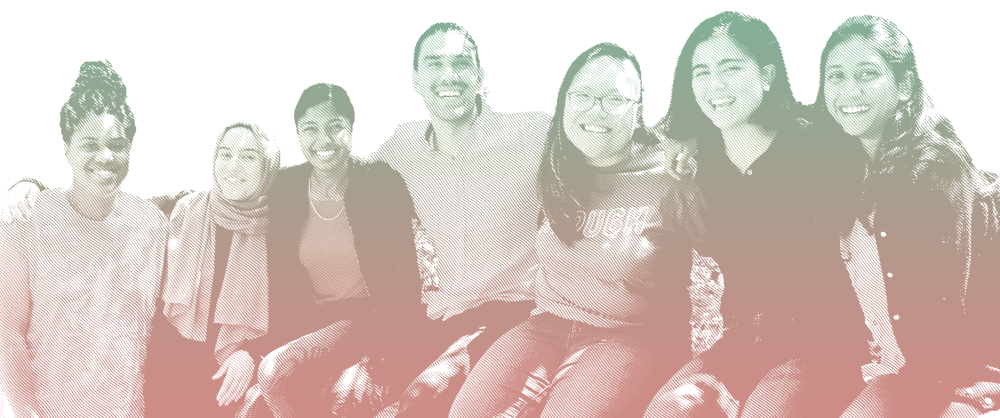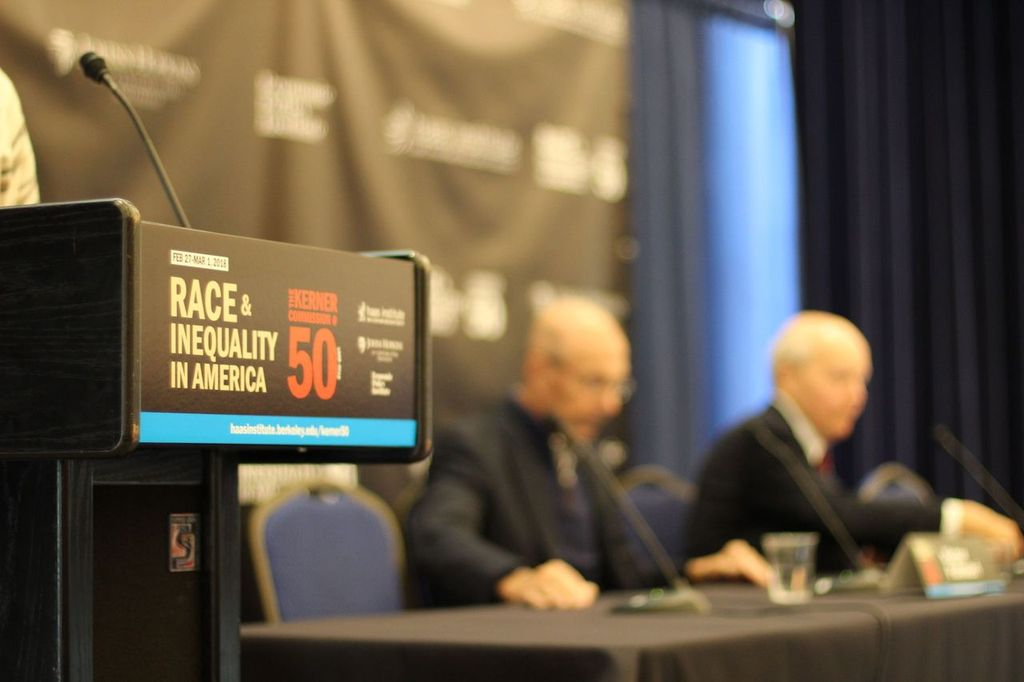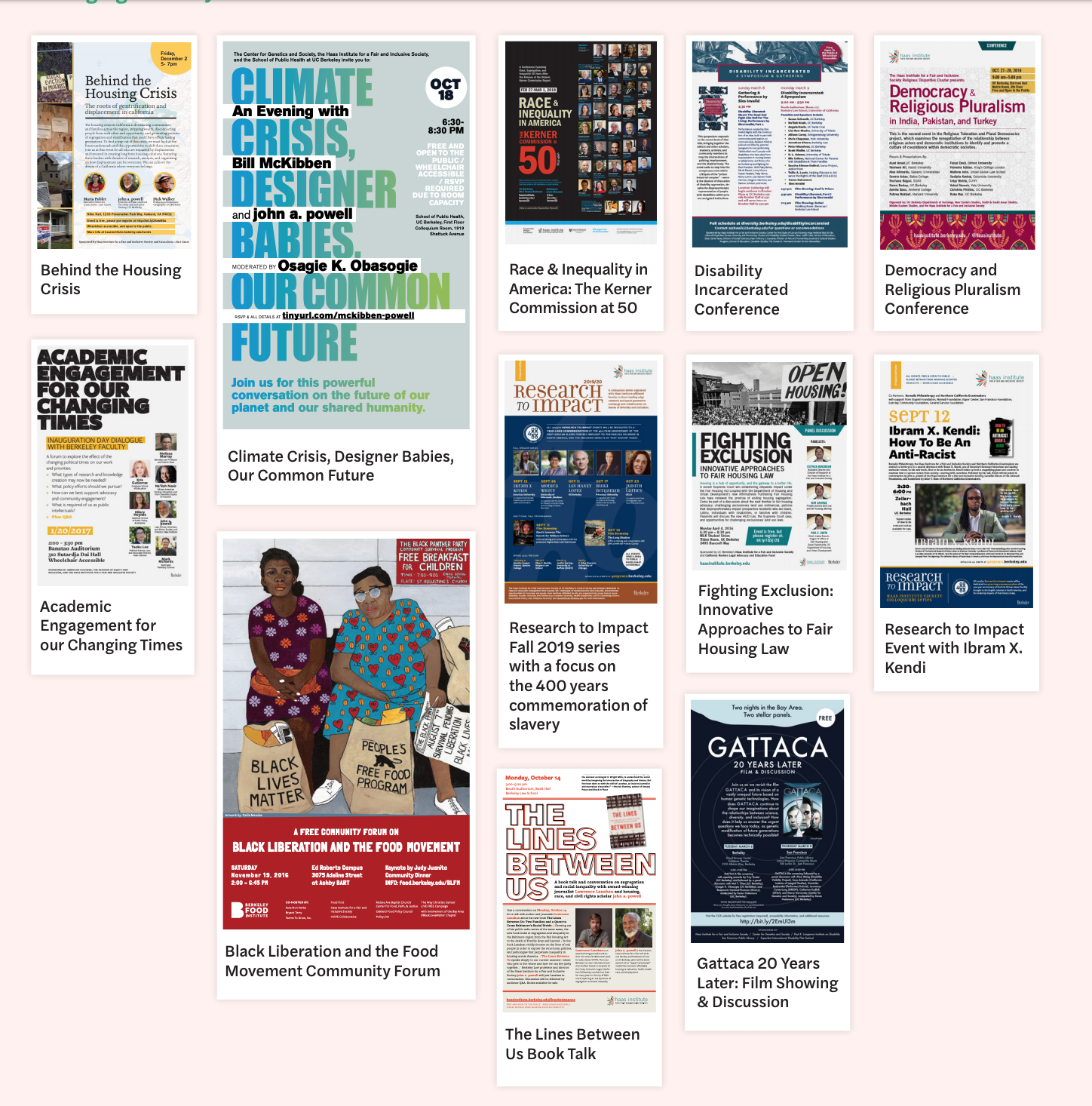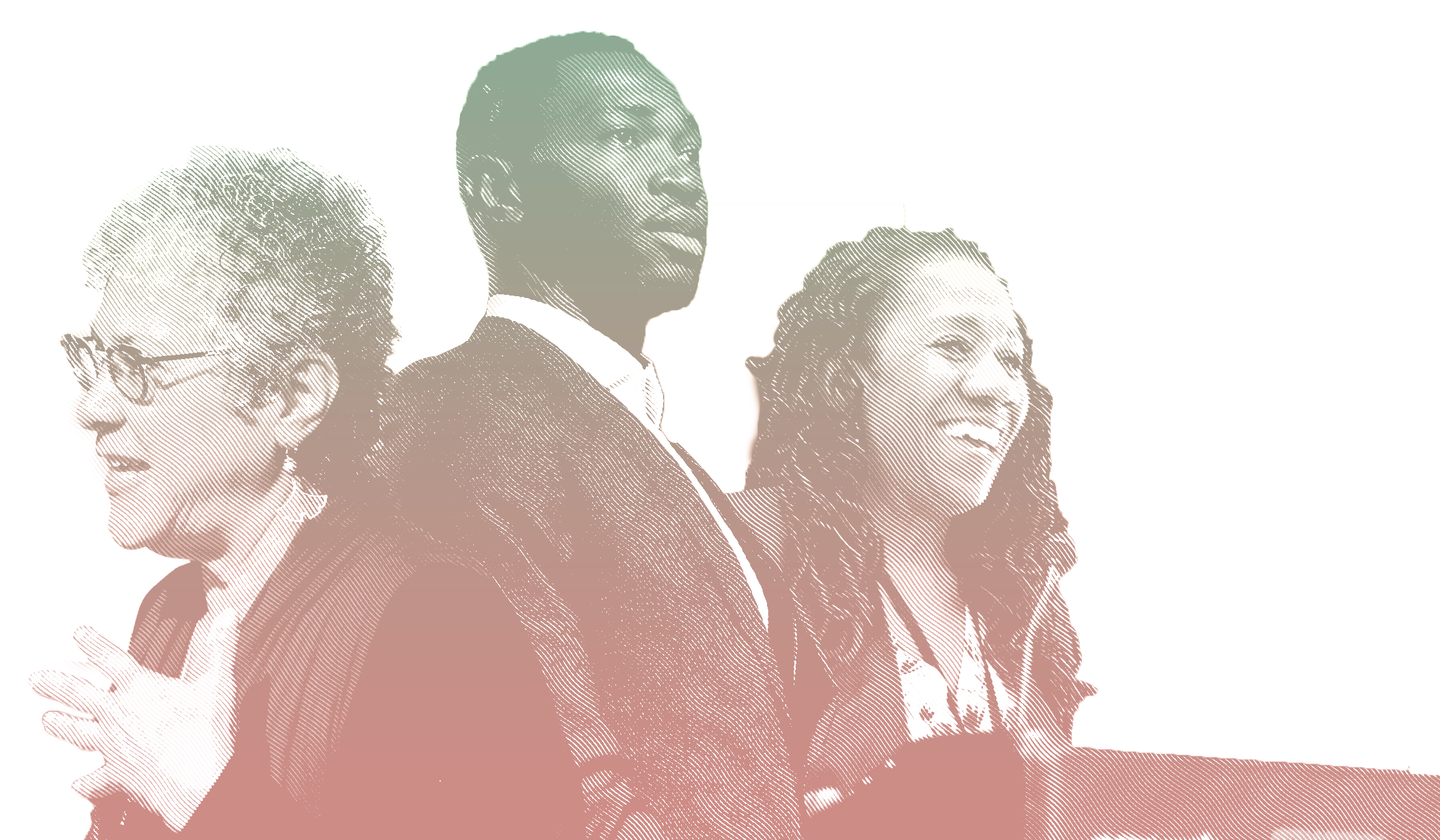Essential to its mission is the Institute’s work to both build as well as be anchored in a broad ecosystem of belonging across sectors, from scholarship to movement building to government, the private sector, and philanthropy. Whether investing in community leadership, training the next generation of scholars and policymakers, or building a powerful platform of public engagement, the Institute’s scholars, events, coalitions, publications, and partnerships inform how academia, social change organizations, and other sectors think about and address issues of equity and inclusion in their work.
A pivotal part of the ecology of this work is the Institute’s emphasis on how groups can either activate bridging or breaking when advancing their work, and the impact that those responses have on full belonging. Bridging, as discussed in Impact Area 2, calls for a deeper inquiry—not just into “them” but into ourselves. Partnerships augment the Institute’s belonging framework by grounding it in the experience of communities, the scale of government, and the potential of work built through and across sectors, while bridging has become an essential pathway for the work of co-creating new structures, systems, and practices. The Institute’s sustainable, long-term and mutually-beneficial relationships have led to working with a wide range of groups from the local to the international (see a full list of Institute partners in the Appendix section).
STRENGTHENING THE FIELD
The Institute’s frameworks and research are influencing the strategy of social movements who are increasingly adopting a belonging framework. A cornerstone of this work is activated through the Institute’s Network for Transformative Change, which operates two central projects: Blueprint for Belonging (B4B) and the Civic Engagement Narrative Change Project.
The Blueprint for Belonging (B4B) program works at a unique nexus of research, community-centered practice, and strategic narrative. Informed by the insights of leading scholars and analytical research, the B4B network has worked to bring different sectors together under a unifying and effective strategic narrative framework of bridging and belonging, B4B is an initiative of more than 20 organizations united in achieving transformative change in California through the development of a strategic narrative that underpins collective work across movements, issues, and policies. The B4B project demonstrates the Institute’s collaborative process in applying research to new ways of framing and organizing narrative strategies to drive more effective and sustainable results.
TESTIMONIAL
“Our Trust Through Reform Project was very much based on the language of bridging and building shared humanity and what john powell says “to imagine a table that was wide enough for everyone suffering.” This frame led us to create new kinds of practices and design spaces that were about building shared humanity and bridging across differences and then creating new structures.” —Rev. Ben McBride, Co-Director, PICO California
Since its inception in 2015, B4B has implemented an array of activities that share analysis to spur transformative change in California and overcome racialized inequities. For example, B4B partners such as PICO California and the Coalition for Humane Immigrant Rights of Los Angeles (CHIRLA) have reoriented their strategies in order to run campaigns that centralize belonging as a core concept. PICO California launched a movement of “becoming and belonging” to strengthen their capacity to become more effective in their work. According to PICO leadership, the training, workshops, and close collaboration with the Institute around bridging and belonging have equipped PICO leaders with a powerful narrative that helped them launch major new initiatives, including an effort between local law enforcement departments and communities of color in 14 cities in California. B4B also commissions and publishes research which has been used to develop powerful multimedia content and messaging in a variety of markets in order to build alignment around an inclusive strategic narrative.
Modeled on the success of B4B, the Civic Engagement Narrative Change project addresses barriers to inclusive democratic participation. Initiatives build on the knowledge and experiences of those who are closest to racial, social, and economic inequities. Through research, surveys, narrative development, and creative arts, the project works to counter voter disenfranchisement, disaffection, and othering in civic life by advancing work that builds a bigger we. The project is anchored in national and state groups who are key leaders in the fight for racial, economic justice, and voting rights. The project has mobilized popular culture to reach young voters and media influencers through Get-Out-The-Vote (GOTV) videos that targeted communities of color in Chicago, Detroit, Houston, Las Vegas, and several counties in Florida. These videos amassed nearly 500,000 views in the week before the 2018 midterm elections.
In the wake of the 2016 Presidential election, the Institute hired a full time researcher to help understand the troubling electoral trends in which race, gender, immigration, and religion were being used to divide the electorate and better understand political polarization. The result was a series of research reports on the changing electorate and how to combat voter suppression and activate civic engagement, such as Widening the Lens on Voter Suppression.
The Civic Engagement project also surveyed 1,700 people in Nevada and Florida to assess voting habits and views on critical issues, and provided funding support for GOTV organizations working in Florida, Nevada, and Pennsylvania who were focused on reaching inconsistent voters and underrepresented groups. These efforts helped cultivate and increase new voter engagement. (See Fig. 6)
This type of empirical data helps the Institute better understand the challenges posed by fear-based narratives that often manufacture and then exploit racial resentment. The scope and depth of this type of work offers a trove of data that is defining a new empirically-based approach to strategic narrative development and strategies for bridging across groups.
CROSS-SECTOR IMPACT
Along with social movement and community organizing outfits, there has been an uptick in a variety of other organizations and institutions reaching out to the O & B Institute to learn how to make a pivot towards belonging. Academic institutions, businesses, the technology sector, and government offices have all sought the advice and work of the Institute in how to apply the framework of belonging in order to structure or reorient their diversity, equity, and inclusion efforts. Ten of the 11 external stakeholders who were interviewed for this impact report credited the Institute’s “othering and belonging framework” as being crucial to their equity and inclusion efforts.
Philanthropic institutions are also using the belonging framework as both an internal and external guide to help define their work, recalibrate their giving strategies, and create tools for their grantees to foster belonging in communities. For example, the Annie E. Casey Foundation’s Equity and Inclusion team set out to examine systems, models, and institutions that advance belonging and opportunity, launching the exploration with Black and Indigenous young men and determine what the attributes are of interactions, experiences, organizations, and systems designed to foster and affirm their belonging. The Seattle Foundation’s “We Belong Here” Initiative seeks to address the challenges of rapid change by “nurturing stronger people-to-people relationships across sectors and communities.”
Institute staff member Takiyah Franklin (second from left), along with members of the Atlantic Fellows for Racial Equity, at the 2019 summer learning program held at UC Berkeley.
LEADERSHIP DEVELOPMENT
In 2016, Atlantic Philanthropies announced a $60 million leadership initiative dedicated to dismantling anti-Black racism in the US and South Africa, two nations with deep and enduring legacies of racial exclusion and violence.
The new initiative, called the Atlantic Fellows for Racial Equity (AFRE) is designed to strengthen the work of academics, activists, and others to enhance their understanding of anti-Black racism in order to lead successful movements for racial equity around the world. The Othering & Belonging Institute was chosen by Atlantic as one of “five renowned champions of racial equity” to help conceive, design, and develop the AFRE program. Hosted at Columbia University and the Nelson Mandela Foundation, AFRE will support up to 350 fellows over its 10-year lifespan. AFRE is as an example of the Institute’s essential belief in the power of long-term strategic partnerships. As an institutional partner of AFRE, the Institute has already trained two cohorts of AFRE fellows in the intricacies of structural racism, othering and belonging, and bridging practices.
Pictured: Fellows from the Institute's 2018 Summer Fellowship cohort.
The Institute also hosts two major resident fellowships. Its innovative Summer Fellowship program is designed to prepare the next generation of community leaders and policymakers who are committed to social and racial justice. The three-month fellowship offers mentorship and hands-on experience with social science researchers, communicators, and artists, with Summer Fellows receiving orientation to the Institute’s frameworks and mentorship in qualitative and quantitative research methodologies in order to hone their skills in developing research outcomes independently.
Since 2013, over 60 Summer Fellows have gone through the program. Fellows have contributed to many of the Institute’s primary areas of work such as publications and events. Former Summer Fellows have gone on to high-impact careers including in academia, grantmaking, and doctoral programs. Others have joined our Institute as full-time researchers. Fellows have shared how their experience at the Institute has catalyzed their careers as well as solidified and deepened their commitment to social justice work.
TESTIMONIAL
“I felt genuinely cared for by the Institute which made it easier to tap into things. I had never paid attention to Richmond City Council before, and I learned it was my right to be there and demand something better. Staying Power gave me a new sense of resilience. —Ciera-Jevae “CiCi” Gordon, Staying Power Alumnae, Media, Arts & Culture Manager, RYSE Center
In 2019 the Institute inaugurated a new fellowship, the Social Inclusion Policy Fellowship program, an intensive two-week residency designed around learning more about implicit bias and how it shows up in policymaking. In partnership with Our Three Winners Foundation and UC Berkeley’s Islamophobia Research and Documentation Project, 10 fellows were selected to come to a two-week residency at Berkeley to learn about how bias towards certain groups enters the policymaking arena, so that they can begin to formulate more equitable policies. Participants included local city council members, aides to state legislators, and public policy students. The fellowship teachings framed Islamophobia as a problem that is rooted in policymaking, and normalized by anti-Muslim tropes in popular media that pass on ideas and stereotypes to the public. The focus of the program was on the pernicious effects and pervasiveness of Islamophobic policies and discourse, the learning benefited all groups. Program design blended academic teachings, such as seminars from experts in law and policy, as well as cultural activities such as calligraphy-writing and Arabic music lessons.
Members of the 2019 Social Inclusion Policy residential fellowship at UC Berkeley.
A community fellowship the Institute was instrumental in developing was the 2018 Staying Power fellowship in Richmond, California. Emblematic of the Institute’s commitment to community-centered leadership as a key component in an ecosystem of belonging, Staying Power fellowship was a six-month paid program for grassroots resident leaders to take part in training, participatory research, creative arts, and organizing. Planned with The Alliance of Californians for Community Empowerment (ACCE), RYSE Center and Safe Return Project, each organization nominated two community residents to become fellows, while O&B Institute staff facilitated the fellowship as a shared infrastructure for leadership development.
Activities of the Staying Power fellows included the design and installation of a “know-your-rights” large-scale public mural in Richmond, which highlighted rent control and fair chance policies. Fellows interviewed community members which they turned into a book of 10 poems; the City Council invited Staying Powers to read a selection of poems at a public City Council meeting. Research projects included studying two new policies that the city is now implementing: protection against source of income discrimination, and a “reusable screening report” ordinance.
Other examples of the Institute’s work at the nexus of culturemaking and community is its cultivation of relationships with local artists and culturemakers. The B4B project has worked directly with community leaders to develop original videos such as #vote4BlackFutures, a dynamic public service announcement of spoken word, music, protest footage, and beautiful Black imagery to highlight the issues that stand to impact the Black community.
PUBLIC ENGAGEMENT
The Institute convenes a variety of events to help the ideas of belonging and formations of bridging take root across sectors. Our most high profile effort has been our Othering & Belonging Conferences. These dynamic and uniquely curated events have prioritized evidence-based learning together with relationship-building in order to create gatherings that model experiential belonging. The conferences have served as a multi-directional catalyst—not only do they seed and popularize work across a range of sectors, but they serve as potent spaces of growth and feedback that informs the work and strategy of the O&B Institute’s research and change agenda as well.
The “Race and Inequality in America: Kerner Commission at 50 conference” is emblematic of the Institute’s focus on the nexus between scholarship, activism, and cultural strategy.
In 2018, another major initiative of the Institute was its co-creation of the Race & Inequality in America: The Kerner Commission at 50 conference. Partnering with Johns Hopkins University and the Economic Policy Institute, the Institute organized a national conference to commemorate the 50th anniversary of the historic Kerner Report, a document—unanimously signed by the bipartisan and politically mainstream Kerner commission— that emphatically concluded that white society had denied opportunity to Black Americans living in poor urban neighborhoods and offered dire warnings along with a bold plan of federal action. The two-day conference, held on the 50th anniversary of the report’s release, served as a comprehensive investigation of race in American society today as well as a roadmap for a policy agenda to grapple with the challenges of racial inequality that still linger. It envisioned what a contemporary Kerner Report might look like in every major area of American life, including housing, education, healthcare, policing, and more.
As division erodes trust in institutions and between communities, the need to hold spaces where dialogue and a robust exchange of ideas can take place is an essential building block of the Institute’s efforts. From brown bags to small-scale trainings to large public conferences, a commitment to public engagement has always been a core tenet of the Institute’s efforts to build belonging. Creating a robust public platform has been and remains an Institute focal point, and organizing and partnering with others to create events has provided a powerful container for advancing bridging and belonging.
Rev. William Barber II closes out the 2019 Othering & Belonging Conference with a call to the stage of all who have experienced being treated as “other” and and a call of action for all who want to move forward together towards belonging.
SIDEBAR:
A Commitment to Public Engagement
Brown bag lectures, community film screenings, scholarly symposia, curriculum training, book launches, artistic exhibits, and large-scale public conferences are all representative of the Othering & Belonging Institute’s commitment to creating spaces that bring people together in order to share ideas, conduct respectful dialogue, and learn from a range of experiences and perspectives.
Othering & Belonging Conferences
The Institute launched the first Othering & Belonging conference in 2015, with the goal to popularize and familiarize partners, movements, and communities with the skills and knowledge to use an othering and belonging framework across a diverse range of sectors. From that first conference in 2015, with standing-room only attendance of over 600 people, to our 2019 conference, with over 1,500 attendees gathered together, these dynamic and uniquely curated events have not only subsequently grown in scale, but also the depth and responsiveness of our programming.
TESTIMONIAL
“What this conference is about is issuing both a loving challenge and urgency for people to understand that we’re deeply connected, that it is about building relationships in those places where we normally don’t build relationships and understanding as we put it, you are my other me—if I don’t begin to recognize you as part of who I am and understand how systemically we are intertwined and we impact each other’s lives, then we can’t look forward to the kind of world that we want to create for our children and our grandchildren.”—Shakti Butler, emcee, Othering & Belonging Conference, 2015 and 2017
Curation of the conferences have increasingly centered on providing key elements to respond to the question, "How do we make belonging real?" The agenda has been organized to invite speakers who emphasize models, narratives, and stories that either advance or inhibit belonging. Through panels, workshops, and featured speakers, the Institute has also centered conference agendas on our work in “breaking and bridging” as responses and formations in an era of rapid change. The Institute is now planning its first conference to be held outside the US (in Europe), while other organizations and institutions have asked to partner with the Institute to bring the unique blend of programming and experiential learning of the Othering and Belonging conferences to their locales.
From left: Shakti Butler, Tarell Alvin McCraney, and Sherrilyn Ifill, all speakers at various Institute public conferences


